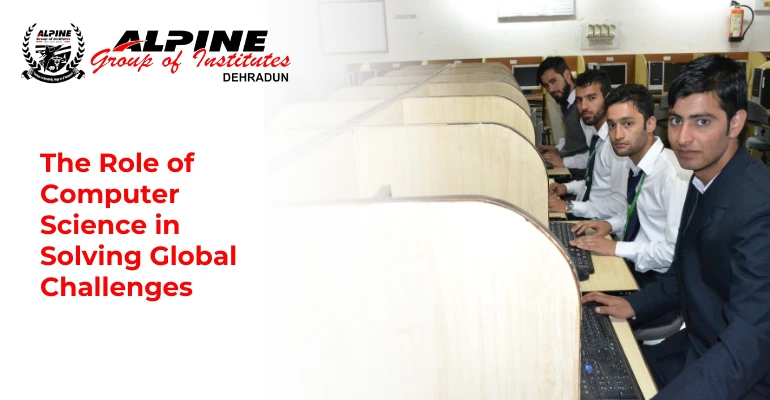The Role of Computer Science in Solving Global Challenges
2024-12-17 6:53The Role of Computer Science in Solving Global Challenges
In today’s interconnected world, global challenges such as climate change, poverty, disease outbreaks, resource scarcity, and geopolitical conflicts are more complex than ever. As these challenges continue to grow in scale and urgency, the need for innovative solutions has never been more pressing. This is where Computer Science (CS) plays a pivotal role. The advancements in data analytics, artificial intelligence (AI), machine learning (ML), cloud computing, and internet of things (IoT) are helping to address and potentially solve many of the world’s most pressing issues. In this blog, we will explore how Computer Science is contributing to solving global challenges and why it is essential for future innovations.
1. Tackling Climate Change with Data and AI
Climate change is one of the most urgent global challenges we face today. It is causing rising sea levels, extreme weather events, and the destruction of ecosystems. Computer Science is playing a crucial role in understanding, mitigating, and adapting to these changes.
- Climate Modeling: Data scientists and climate researchers use computational models to predict future climate conditions. These models help policymakers understand the potential impact of climate change and develop strategies for reducing carbon emissions and mitigating its effects.
- AI for Renewable Energy: AI is being used to optimize energy systems, improve energy efficiency, and predict energy demands. For example, machine learning algorithms can forecast weather patterns to optimize the performance of solar panels and wind turbines.
- Smart Cities: Technologies like IoT and AI are enabling the creation of smart cities that manage resources more efficiently, reduce carbon footprints, and improve urban sustainability. From optimizing traffic flow to reducing energy consumption, computer science is making cities more eco-friendly.
By leveraging computational models and real-time data, Computer Science is providing the tools needed to understand the complexities of climate change and develop innovative solutions for sustainability.
2. Improving Healthcare and Medical Research
The healthcare sector is another area where Computer Science is making significant strides, helping to improve both the quality and accessibility of healthcare worldwide.
- AI for Diagnostics: AI algorithms are being trained to diagnose diseases such as cancer, heart disease, and diabetes more accurately and quickly than traditional methods. These AI systems can analyze medical images, scan patient records, and predict health conditions, offering early detection and personalized treatment options.
- Telemedicine: Telemedicine platforms powered by computer science enable remote consultations between doctors and patients, improving healthcare access in underserved regions and reducing the burden on healthcare systems.
- Drug Discovery: Machine learning is revolutionizing drug discovery by predicting how different molecules will interact with the human body. This accelerates the process of finding cures for diseases and reduces the cost and time of research and clinical trials.
- Health Data Analytics: The ability to analyze large datasets has transformed the healthcare industry. By analyzing patient data, computer scientists can uncover trends and insights that lead to better disease prevention, optimized treatment plans, and improved public health management.
Through AI, data analytics, and telemedicine, Computer Science is directly contributing to healthier populations and better healthcare delivery systems.
3. Fighting Poverty and Inequality
Poverty and inequality are persistent global challenges that hinder social and economic development. Computer Science is playing a vital role in alleviating these issues, creating systems that can improve access to essential resources such as education, healthcare, and financial services.
- Financial Inclusion: In many parts of the world, traditional banking services are not accessible to large populations. Mobile banking and digital payment systems powered by computer science are helping to provide financial inclusion by offering digital banking services, microloans, and financial literacy programs to underserved communities.
- Education for All: With the rise of e-learning platforms, computer science is democratizing education, allowing people in remote and impoverished areas to access quality educational resources. AI-driven learning systems also help create personalized learning experiences, improving educational outcomes for students with diverse needs.
- Supply Chain Optimization: Computer Science is helping to optimize global supply chains, ensuring that essential resources like food, clean water, and medicine are distributed efficiently. Algorithms can predict and mitigate supply chain disruptions, especially during crises like pandemics or natural disasters.
By leveraging digital technologies, Computer Science is enabling better access to resources, opportunities, and services, helping to lift people out of poverty and reduce inequality.
4. Combating Global Health Crises (Pandemics and Disease Outbreaks)
The COVID-19 pandemic highlighted the crucial role of Computer Science in managing public health crises. From contact tracing to vaccine distribution, technology has been at the heart of pandemic response efforts.
- Epidemic Prediction and Modeling: Machine learning models have been instrumental in predicting the spread of diseases, allowing governments and healthcare organizations to respond proactively. AI-powered epidemiological models can analyze patterns in disease transmission, helping to identify potential hotspots and allocate resources more effectively.
- Vaccine Development: AI and supercomputing have accelerated the process of vaccine development by predicting how viruses mutate and how potential vaccines might respond to them. AI tools also helped researchers simulate the effectiveness of different vaccine candidates.
- Contact Tracing and Health Monitoring: Mobile apps and wearables that track health data have played a crucial role in contact tracing and monitoring the health of individuals during pandemics. AI can also help identify outbreaks early, which is essential for preventing further spread.
By combining big data analytics, AI, and cloud computing, Computer Science is enabling faster, more efficient responses to global health crises, improving our ability to control pandemics and protect public health.
5. Enhancing Food Security
With the global population set to reach 9.7 billion by 2050, food security is becoming an increasingly pressing issue. Computer Science is helping to tackle food shortages and improve agricultural productivity.
- Precision Agriculture: IoT sensors, drones, and AI are transforming agriculture by providing farmers with real-time data on soil health, crop conditions, and weather forecasts. This precision agriculture allows for better resource management, reducing waste and improving crop yields.
- Supply Chain Optimization: By using blockchain technology, food supply chains can be made more transparent and efficient, reducing food waste and ensuring that food is distributed fairly to those in need.
- Food Waste Reduction: Machine learning algorithms are helping companies predict consumer demand, reducing food overproduction and waste. AI can also help identify food spoilage patterns, ensuring that food is used before it goes bad.
Computer Science is directly contributing to more sustainable and efficient agricultural practices, ensuring that food resources are available to support a growing global population.
6. Addressing Water Scarcity
Water scarcity is one of the most critical issues facing many regions, especially in parts of Africa, Asia, and the Middle East. Computer Science is playing a role in managing and conserving water resources.
- Smart Water Management: IoT sensors are being used to monitor and manage water distribution systems, ensuring that water is used efficiently and waste is minimized. AI can analyze data from these sensors to predict and prevent leaks or failures in the water infrastructure.
- Water Conservation Algorithms: AI algorithms help optimize irrigation systems in agriculture, reducing water consumption while ensuring that crops receive the necessary amount of water. Similarly, AI can optimize water usage in households and industries.
By applying smart technology and data analytics to water management systems, Computer Science is helping to ensure that water resources are used sustainably and equitably.
Conclusion
Computer Science is not just about coding and software development. It is a powerful tool for solving global challenges, from combating climate change and improving healthcare to fighting poverty and ensuring food and water security. As we continue to face complex, interconnected problems, the contributions of Computer Science will be essential in finding innovative, scalable solutions.
For B. Tech Computer Science students, this represents an incredible opportunity to not only build a successful career but also to make a meaningful impact on the world. Whether through AI, data science, cloud computing, or blockchain, the role of Computer Science in addressing global challenges is undeniable. By choosing to focus on these areas, students can contribute to shaping a better, more sustainable future for everyone.









